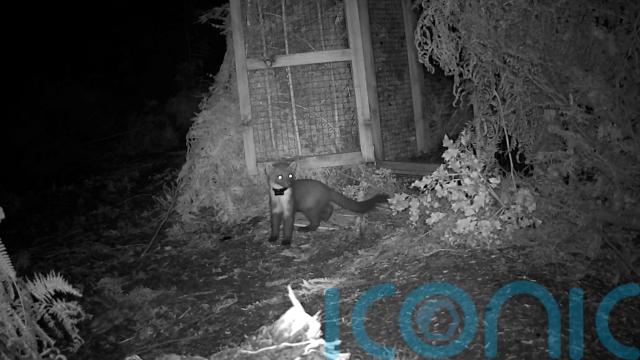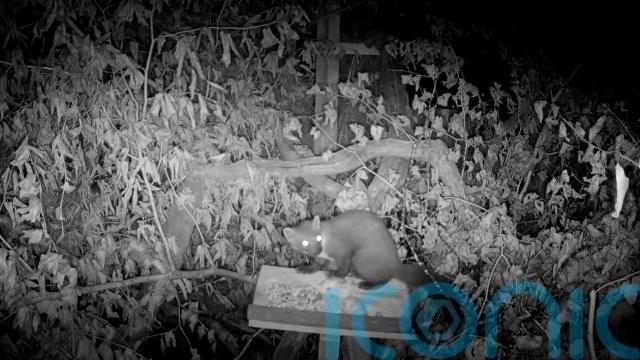
Pine martens have been released in Exmoor National Park in the first official return of the native animals to the area for more than a century, conservationists said.
Some 19 pine martens – animals the size of a small cat from the same family as weasels and otters – were released during September at secret woodland locations owned by the National Trust and Exmoor National Park Authority.
The project, which has also involved the release of pine martens in Dartmoor National Park last year, aims to restore the animals that play a key role in their habitat and help create thriving, resilient woodlands, wildlife experts said.
Pine martens were once common in Exmoor, but were lost due to hunting and the decline of their favoured woodland habitat.

Although sightings have been reported sporadically of pine martens in the area, this is the first official, planned and licensed reintroduction, the team led by Devon Wildlife Trust said.
The new arrivals – nine females and 10 males – were taken from healthy wild populations in the Highlands of Scotland.
After health checks in Scotland, they were driven 500 miles through the night to Exmoor, before being housed individually in specially constructed release pens each with a den box and fresh food and water.
After three days to allow them to acclimatise to their new surroundings, the door to the pens were opened and they were able to start to explore their new wild home.
The pine martens, which are solitary, shy and mainly nocturnal, have been radio-collared to allow the team behind the release to monitor their movements for the first few months of their time in Exmoor.
The collars are designed to fall off the animals after about six to nine months.
The pine martens have been released in autumn to take advantage of the abundance of wild autumn fruits, which they eat at this time of year, along with hunting for prey such as voles, mice and grey squirrels.
It is also hoped the animals, which mate in the summer but do not actually become pregnant until the winter, allowing the females to be moved in autumn, will produce kits next year.
The release marks the culmination of seven years of planning by the Two Moors Pine Marten Project – a partnership between Dartmoor National Park Authority, Devon Wildlife Trust, Exmoor National Park Authority, Forestry England, National Trust, Somerset Wildlife Trust and Woodland Trust.
The scheme has also had expert assistance from the Vincent Wildlife Trust and has worked with local volunteers, landowners and communities in Exmoor and Dartmoor.
Last autumn, eight females and seven males were released in undisclosed locations in Dartmoor, and conservationists were “ecstatic” to discover they had successfully bred, with camera traps catching footage of kits scampering through woodland this summer.
Devon Wildlife Trust’s Tracey Hamston, who leads the Two Moor Pine Marten Project, said having pine martens living wild in Exmoor again was a “positive sign that nature can be restored”.
She told the PA news agency that Devon Wildlife Trusts and the other partner organisations wanted to bring back lost wildlife, and restore habitats which had lost a lot of species, such as woodlands.
“Pine martens are a key part of our woodlands. They do what really nothing else does,” she said.
They spend time in the trees as well as on the ground, they are a generalist predator of common and abundant species – some of which can have negative impacts on the habitat – and so keep the ecosystem in balance, and they eat fruit and spread the seeds through the woods.
Dr Hamston said the south west was lucky to have some remnants of temperate rainforest – a now extremely rare, nature-rich woodland habitat – but most of the region’s woods were “nowhere near” as good.

“Our vision is to see woodlands that are thriving and functioning and full of wildlife, particularly greater abundance of rarer species and having more species diversity, which gives them more resilience, especially in the changing environment which we’re in.
“That’s really important not just for the wildlife, but for people as well to be able to experience woodlands that are working properly,” she said.
Simon Larkins, National Trust general manager for Somerset coast and countryside, said the return of pine martens to Exmoor was a “truly special moment”.
“As a keystone species, pine martens play a vital role in woodland ecosystems, helping to create healthier habitats and supporting wider biodiversity.
“Their presence is a powerful reminder that when we give nature space and opportunity, recovery can happen.”
Subscribe or register today to discover more from DonegalLive.ie
Buy the e-paper of the Donegal Democrat, Donegal People's Press, Donegal Post and Inish Times here for instant access to Donegal's premier news titles.
Keep up with the latest news from Donegal with our daily newsletter featuring the most important stories of the day delivered to your inbox every evening at 5pm.